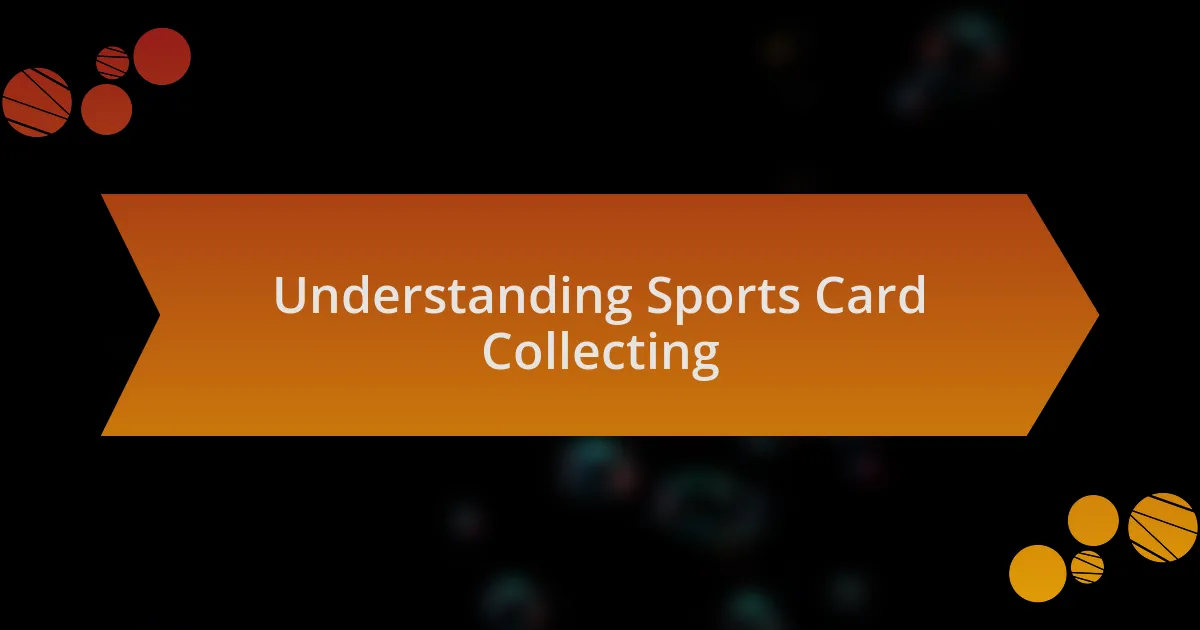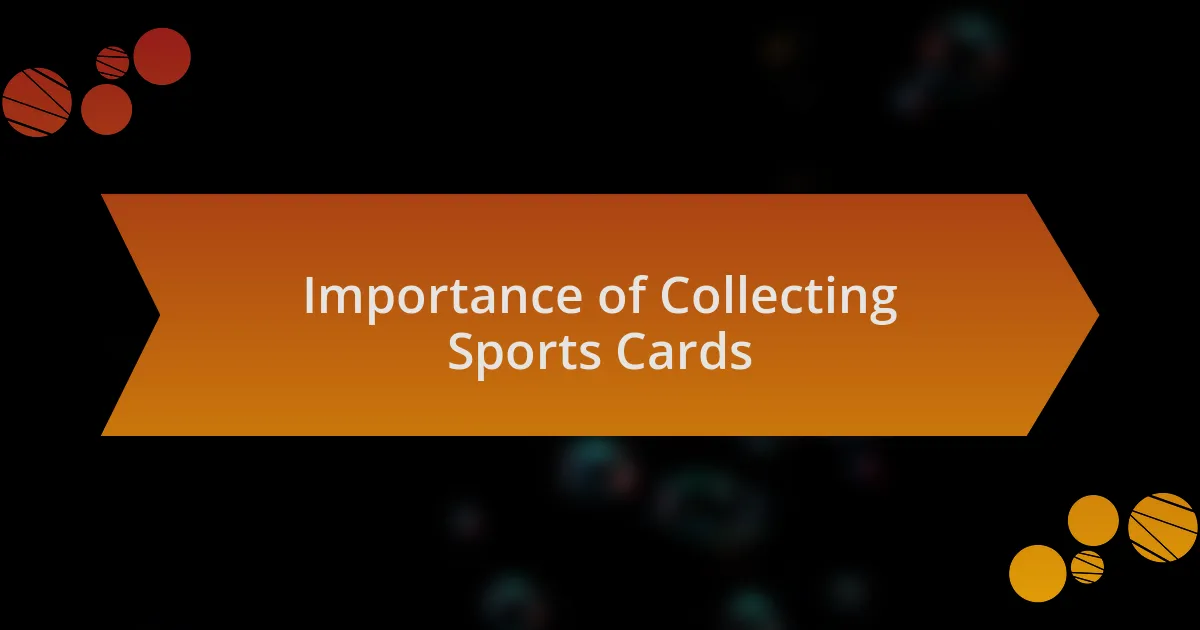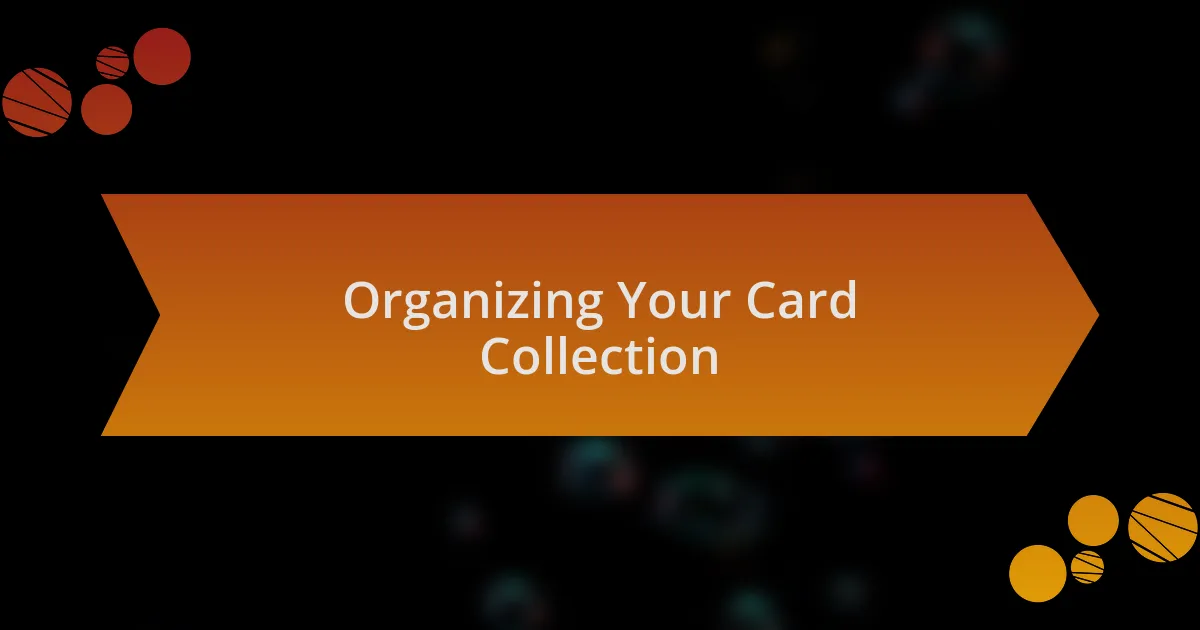Key takeaways:
- Sports card collecting connects fans emotionally to players and memories, making the value of cards more about personal significance than market price.
- The community aspect of collecting fosters friendships and shared knowledge, enriching the overall experience of the hobby.
- Researching card values and trends is essential for making informed decisions and enhancing the financial aspect of collecting.
- Organizing a collection not only allows for better appreciation of the cards but also reflects personal taste and passion as a collector.

Understanding Sports Card Collecting
Sports card collecting is more than just a hobby; it’s an emotional journey that connects fans to their favorite players and memorable moments in sports history. I still remember the thrill of flipping through my first pack of cards and discovering a rookie player who would later become a superstar. Can you recall the excitement of finding that elusive card that made your heart race?
As I took the plunge into collecting, I discovered the importance of understanding card values and rarity. It’s fascinating how some cards can appreciate in value while others fade into obscurity. For instance, when I invested in a limited edition card that I thought was a long shot, watching its value soar was a rewarding surprise. Does value equate to personal significance, though? Often, what makes a card special isn’t the price tag, but the memories attached to it.
The community aspect of sports card collecting also plays a huge role in the experience. I’ve spent countless weekends at local card shows, trading stories and cards with fellow enthusiasts. Engaging with others who share your passion often leads to unexpected friendships and newfound knowledge. Isn’t it invigorating to be part of a community that cherishes the same thrill of the hunt?

Importance of Collecting Sports Cards
Collecting sports cards is not just about acquiring items; it’s a way to preserve memories and celebrate the history of sports. I vividly recall the first time I held a card featuring a player whose game-winning shot I watched live. That tangible reminder took me right back to that exhilarating moment. Have you ever held a piece of memorabilia that transported you in time?
Value is certainly a factor in sports cards, but it’s the stories behind each card that truly matter. For example, I once made a trade for a card linked to a player who inspired me during my childhood. Beyond just the card’s market value, its significance was amplified by the emotions it stirred within me. Isn’t it fascinating how a small piece of cardboard can connect us to our past?
The thrill of collecting also creates opportunities for learning. Through my journey, I’ve studied various aspects of the sport, including statistics and player backgrounds, enhancing my appreciation for the game. Each new card adds a layer of understanding and connection to the sport. How has your collection deepened your knowledge and passion for sports? There’s something incredibly rewarding about combining fun and education in this unique hobby.

Researching Card Values and Trends
Researching card values and trends is a vital step in the collecting process. When I first started, I spent countless hours pouring over online marketplaces and price guides, fascinated by the fluctuations in card values. Have you noticed how certain cards can skyrocket in value overnight? It’s a wild world, and staying informed is crucial.
One time, I remember tracking the value of a specific rookie card. The moment I saw it spike after a strong performance from the player, my heart raced. I rushed to check my own collection, feeling a mix of excitement and anxiety—what if I’d missed my chance to cash in? This experience taught me that keeping an eye on player performance and market trends can have real financial implications for collectors.
I’ve also found that communities, like forums and social media groups, provide invaluable insights into current trends. Engaging with others has given me perspectives I hadn’t considered, like the significance of a player’s legacy on their card’s value. Have you ever had a conversation with another collector that completely changed your outlook? These discussions not only inform but enhance our collective appreciation for the hobby.

Finding Reliable Sources for Cards
Finding reliable sources for sports cards can be quite a journey. I remember when I stumbled upon an old card shop in my hometown. The owner wasn’t just a seller; he was a treasure trove of knowledge. Engaging in conversation with him not only helped me find rare cards but also taught me the importance of trusting experienced collectors.
Online resources can be hit or miss, but I’ve found that reputable auction sites often provide authentic listings and grading information. Have you ever questioned whether a deal was too good to be true? I learned that checking the seller’s reputation and reading reviews made all the difference in ensuring I was making wise investments. Each purchase became more rewarding as I became more aware of the credibility of the sources I chose.
Additionally, I frequently turn to well-established price guides, like Beckett, which offer detailed evaluations. I can still recall how consulting one helped me identify the true worth of my collection during a big card show. Reading those evaluations not only calmed my nerves about pricing but also empowered me as a collector. The more I educated myself, the clearer it became that a little research pays off significantly in the long run.

Organizing Your Card Collection
Organizing your card collection may seem overwhelming at first, but it can actually be a rewarding experience. I remember when I tackled my own collection; I started by sorting cards by player and team. Each time I came across a new addition, it felt like reuniting with an old friend. It’s a simple approach, but it allows me to appreciate my collection on a personal level.
As my collection grew, I found that using binders with protective sleeves worked wonders. Each page turned into a mini-exhibit, showcasing not just the cards but also the memories connected to them. Have you ever flipped through your collection and felt that rush of nostalgia? That’s the magic of organizing – it transforms a pile of cards into a curated gallery of your journey as a collector.
I also experimented with digital tools to keep track of my collection, which added a modern twist to my organizing process. Creating a spreadsheet helped me monitor values and identify gaps in my collection, which I found surprisingly satisfying. There’s something exhilarating about having everything documented, as if I’m building a masterpiece that only I can unveil. How do you keep your collection organized? I believe that the way you choose to arrange your cards reflects your personal taste and passion as a collector.

Personal Collecting Goals and Strategies
When I first started collecting sports cards, I set specific goals to guide my journey. For instance, I aimed to complete a vintage set from the 1980s, which was exciting yet daunting. Each card I acquired felt like a step closer to achieving something significant, almost like a treasure hunt where the thrill of the chase fueled my passion.
One strategy I adopted involved networking with other collectors. By attending local card shows, I discovered the importance of building relationships within the community. I vividly recall trading a rarely found card for two I had been searching for, and the satisfaction of that exchange still sticks with me. Have you ever traded cards with someone and felt that spark of camaraderie? It’s in those moments that I realized collecting is not just about the cards but the shared experiences that come with it.
I also keep a wishlist that reflects not only the cards I want but also the memories or stories behind them. If I recall watching a specific game or player when I was younger, that card’s value to me skyrockets. This approach has taught me that my collection isn’t merely a monetary investment; it’s a collection of moments and emotions finely woven into my life’s tapestry. How do your own memories shape your collecting goals? I’ve found that personal connections can make each card feel truly special.

Sharing Your Collection with Others
Sharing your collection with others can be an incredibly rewarding experience. I remember the first time I invited friends over for a card show-and-tell. Their genuine interest in my cards made me see them in a new light, facilitating lively discussions about our favorite players and memorable games. Isn’t it amazing how a stack of cards can spark stories and laughter, helping us connect on a deeper level?
I’ve also found social media to be a fantastic platform for showcasing my collection. Posting pictures of my rare finds not only lets me share my passion but also opens doors to new friendships and networking opportunities. When someone comments on a favorite card of theirs or shares a similar story, it feels like igniting a shared passion across miles. Have you ever made a connection online over a shared interest? Those moments highlight how collecting can transcend geographical boundaries.
Attending local collector meetups has been a game-changer for my collection-sharing journey. I still get excited thinking about the last event I attended, where I displayed a card that caught the eye of a fellow collector. We spent hours talking and negotiating, culminating in a fair trade that left us both thrilled. What’s more rewarding than trading a piece of your collection with someone who truly appreciates it? Those shared passions transform collecting into a community experience, where the thrill of the exchange becomes just as meaningful as the cards themselves.